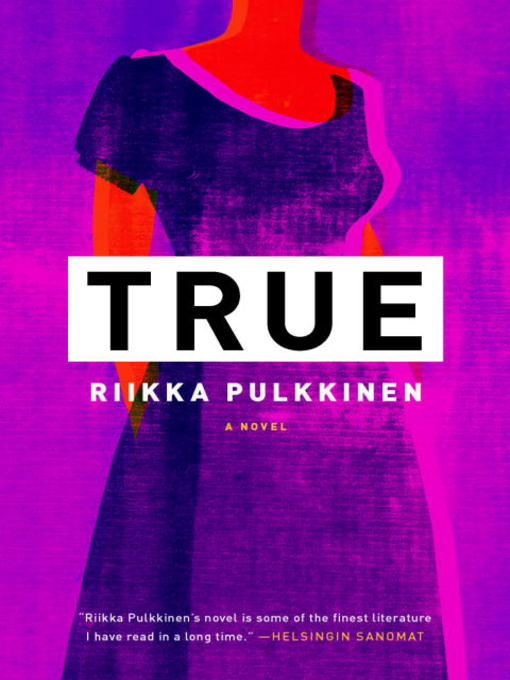
True
A Novel
کتاب های مرتبط
- اطلاعات
- نقد و بررسی
- دیدگاه کاربران
نقد و بررسی

January 9, 2012
In Pulkkinen’s second novel, her first to be translated into English, the Finnish author tells the story of Elsa, a well-known child psychologist; her husband, Martti, a painter; their doctor daughter Elenoora; and Anna and Maria, their 20-something granddaughters. All have assembled around Elsa as she succumbs to cancer. Anna and her grandmother have always been kindred spirits, often playing dress up and picnicking in the park, and it’s Anna’s choice of outfit for one of these outings that opens a window into a forgotten chapter of Martti and Elsa’s past. The frock that Anna plucks from the closet belongs not to Elsa but to Eeva, Elenoora’s former nanny, with whom Martti had an ongoing affair during Elsa’s scholarly trips. While Anna obsesses over her grandparents’ past, seeing in it an alternate life that she so longs for, having to face her father’s betrayal makes Elenoora question everything. Pulkkinen has a fine eye for description and infuses her characters with longing, but the story is familiar: desire for a different life than the one we’ve chosen. An eloquent family saga that falls short of revelation. Agent: Hanna Kjelberg, Otava Group Agency.

February 15, 2012
In Finnish author Pulkkinen's first novel to be translated into English, a dying woman and her family become a prism illuminating love from a variety of often-uncomfortable angles. Child psychologist Elsa and artist Martti Ahlqvist have had a long, apparently successful marriage. Their only child, Eleonoora, is a tirelessly efficient doctor with an understanding husband and two grown daughters of her own. In the final stage of terminal cancer Elsa comes home from the hospital to live her last days to the fullest. When Eleonoora's older daughter Anna, an emotionally troubled graduate student, comes to visit and give Martti a few free hours, Elsa arranges to picnic and play dress-up as they did when Anna was a child. But the dress Anna puts on never belonged to her grandmother. A surprised Elsa explains it belonged to a woman named Eeva. Eeva was Eleonoora's nanny, hired so that Elsa could leave her very young daughter for weeks at a time while traveling for her career. Eeva also became Martti's lover. As the characters remember or imagine Eeva's life, she becomes a receptacle for all the forms love has taken in their lives. Imagining Eeva's passion for Martti and Eleonoora as a child, Anna is influenced by her own unshakable sense of loss as she continues to miss the child of a former lover. Eleonoora, who does not consciously remember Eeva, has co-mingled memories of mother and nanny, but her deep-rooted fear of abandonment keeps her emotionally wary. Even now, while dreading a life without Elsa, whom he has truly loved, Martti remembers Eeva with a mixture of longing and remorse. How much guilt should Martti, or Elsa, feel for what ultimately happened? Is blame even relevant? Was the nanny a surrogate wife and mother or a usurper? Eeva remains tantalizingly elusive as she becomes more real, a girl from the country swept up by the cultural changes of the 1960s. The emotional intelligence of the prose avoids melodrama to develop authentic poignancy.
COPYRIGHT(2012) Kirkus Reviews, ALL RIGHTS RESERVED.

March 1, 2012
Maybe the recent flurry of genre fiction from Scandinavia has sparked an interest in translations of its literary fiction as well. Or maybe this prize-winning Finnish novel was simply too good to pass up. The plot is an old one--the husband of a prominent family falls for his child's nanny--but the story is made fresh by its complex play of past and present and richly rendered characterizations. In a narrative that spans two generations, the author movingly captures the passions between lovers and the affections between children and caretakers, so that one's sympathies constantly shift. Martti, a well-known painter, and his wife, Elsa, a child psychologist, are too distracted by their careers and egos to pay attention to their young daughter, Eleonoora, or to their own drifting relationship. Eeva, the young nanny, seems to come alive as she grows entangled in the family and loses her way against the dynamic backdrop of 1960s Europe's changing mores and political scene. Years later, as Elsa is dying of cancer, one of Eleonoora's daughters puts together the clues of her grandparents' relationship. VERDICT A beautiful, sensuous novel; for most readers.--Reba Leiding, James Madison Univ. Libs., Harrisonburg, VA
Copyright 2012 Library Journal, LLC Used with permission.

























دیدگاه کاربران